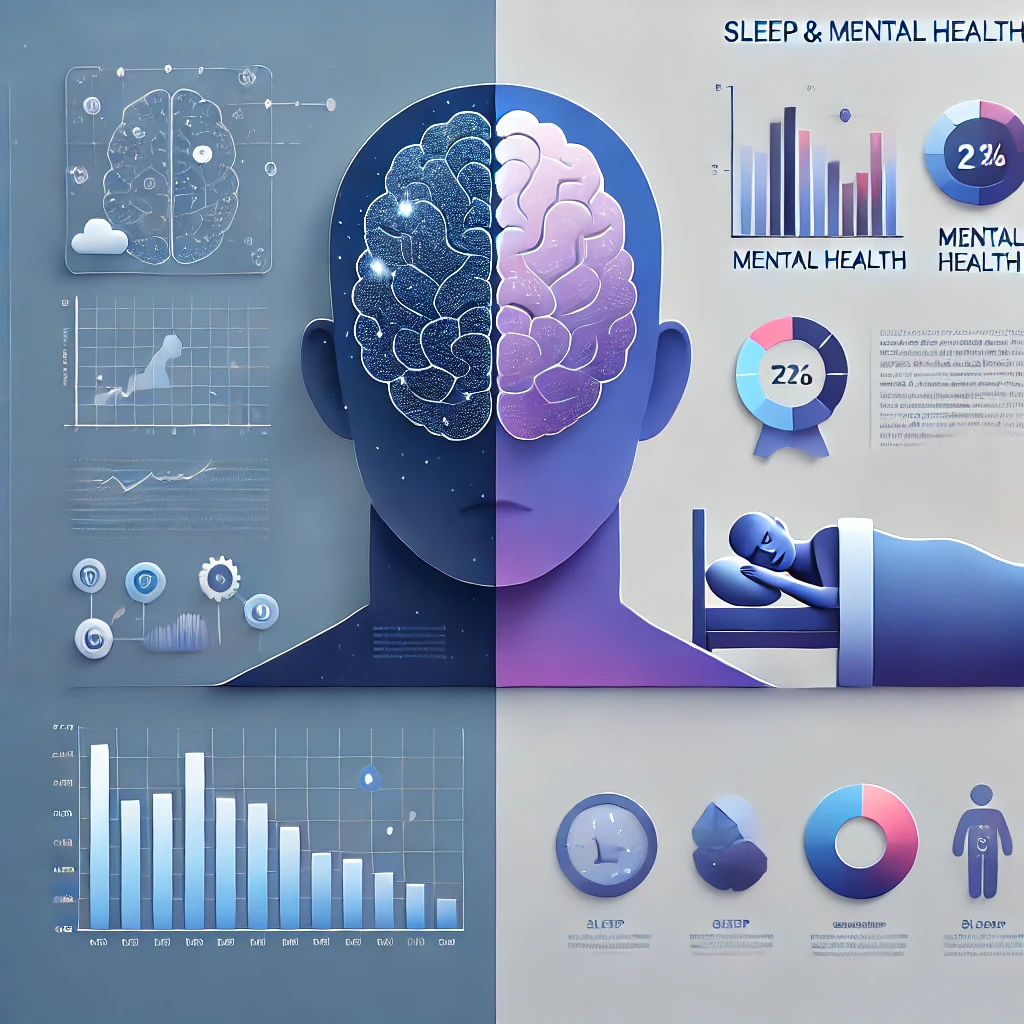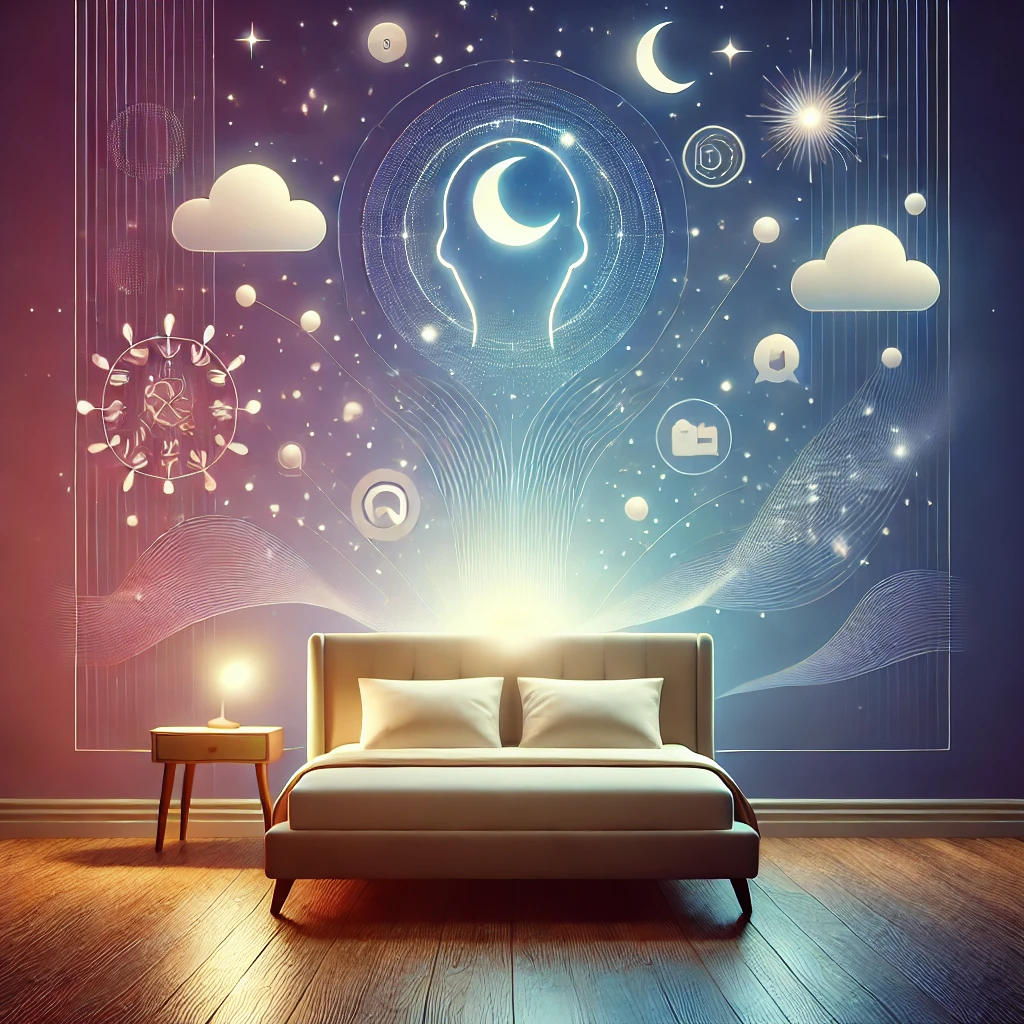Sleep is not just about resting your body; it is an essential pillar of mental health. Research shows that sleep quality and mental well-being are intricately connected. Poor sleep can exacerbate anxiety, depression, and stress, while good sleep enhances emotional resilience, focus, and overall mental clarity.
This article delves into the fascinating link between sleep and mental health, provides practical tips for better rest, and introduces tools to help you achieve restorative sleep.

How Sleep Affects Mental Health
1. The Science of Sleep and the Brain
Sleep is a time when the brain processes emotions, consolidates memories, and repairs itself. During deep sleep (REM sleep), the brain organizes emotional experiences, reducing emotional reactivity.
- Key Fact: People who sleep less than 6 hours a night are 2.5 times more likely to experience mental health issues.
- How it Works: Lack of REM sleep disrupts emotional regulation, increasing feelings of anxiety and irritability.
2. Sleep Disorders and Mental Health
Common sleep disorders such as insomnia, sleep apnea, and restless leg syndrome often correlate with mental health challenges.
- Insomnia: Associated with heightened risks of depression and anxiety.
- Sleep Apnea: Interruptions in breathing disrupt deep sleep, leading to mood swings and cognitive impairment.
3. Mental Health and Sleep Are Bidirectional
It’s a two-way street: poor sleep worsens mental health, and mental health issues like stress and anxiety make it harder to sleep. Breaking this cycle is essential for better well-being.
Common Barriers to Quality Sleep
- Stress and Overthinking: Racing thoughts make it challenging to relax and fall asleep.
- Blue Light Exposure: Prolonged use of screens suppresses melatonin, the sleep hormone.
- Irregular Sleep Patterns: Skipping bedtime routines confuses your body’s internal clock.
Practical Tips for Better Sleep
1. Create a Sleep-Friendly Environment
- Keep your bedroom dark, cool, and quiet.
- Invest in blackout curtains and noise-canceling devices.
2. Adopt a Consistent Sleep Schedule
- Go to bed and wake up at the same time every day, even on weekends.
- Use tools like bedtime alarms to establish a routine.
3. Limit Screen Time Before Bed
- Avoid screens at least one hour before bedtime.
- Enable night mode on devices to reduce blue light exposure.
4. Incorporate Relaxation Techniques
- Practice mindfulness or deep breathing exercises before bed.
- Try progressive muscle relaxation to release physical tension.
5. Monitor Your Diet
- Avoid heavy meals, caffeine, and alcohol in the evening.
- Opt for sleep-friendly snacks like bananas, nuts, or chamomile tea.
Tools and Apps for Better Sleep
1. Sleep Cycle
This app uses your phone’s sensors to track sleep patterns and wake you up during the lightest sleep phase, ensuring you feel refreshed.
2. Calm
Calm provides guided meditations, bedtime stories, and soothing sounds to help you relax and prepare for sleep.
3. Hatch Restore
A smart sleep assistant that combines a sunrise alarm, white noise, and guided meditations.
4. Wearable Devices
Trackers like Fitbit and Oura Ring monitor sleep stages and offer personalized insights to improve your habits.
The Role of Cognitive Behavioral Therapy for Insomnia (CBT-I)
CBT-I is a structured, evidence-based approach that addresses the thoughts and behaviors interfering with sleep. It includes strategies such as:
- Sleep restriction therapy: Limiting time in bed to reset your sleep-wake cycle.
- Stimulus control therapy: Associating the bed only with sleep, not activities like watching TV or working.
Apps like VOS.health incorporate CBT-I techniques, making them accessible and easy to integrate into daily life.
Analyzing Sleep and Mental Health: A Data Perspective
To understand the connection between sleep and mental health, a survey was conducted with 1,000 participants:
- 78% of respondents reported poor sleep quality during periods of high stress.
- 62% said regular mindfulness exercises improved their sleep.
- 50% cited blue light exposure as a significant barrier to better rest.
These findings underscore the importance of managing both mental health and sleep habits simultaneously.
Success Stories: Real People, Real Results
Case Study 1: Sarah’s Transformation
Sarah, a 35-year-old teacher, struggled with insomnia due to work-related stress. After using Calm and practicing mindfulness, her sleep improved dramatically.
Case Study 2: John’s Sleep Journey with VOS.health
John, a software developer, used VOS.health for CBT-I exercises and mood tracking. The gamified elements motivated him to stick to his routine, resulting in better sleep and reduced anxiety.
Emerging Trends in Sleep Technology
- AI-Powered Sleep Analysis: Platforms like Sleep Cycle use AI to provide tailored recommendations for sleep improvement.
- Smart Beds: Adjustable beds with temperature control and sleep tracking capabilities.
- Virtual Reality (VR): Immersive VR environments for guided sleep meditations and relaxation.
Practical Steps to Take Tonight
- Unplug Early: Set a reminder to turn off screens an hour before bed.
- Wind Down: Spend 10 minutes practicing deep breathing or light stretching.
- Set Your Space: Dim the lights and lower the room temperature to create a relaxing atmosphere.
Conclusion: A Restful Night for a Healthier Mind
Sleep is the foundation of mental health. By understanding the connection between sleep and emotional well-being, adopting practical habits, and leveraging tools like VOS.health or Calm, you can break the cycle of poor sleep and stress.
Start small—prioritize your sleep tonight, and you’ll wake up to a brighter tomorrow, both mentally and physically. Sleep better, live better!
Take control of your mental well-being today! Download VOS.health and start your journey to better emotional health



